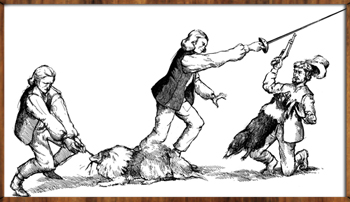
Caesar; or, The Watchdog of the Castle
Caesar; or, The Watchdog of the Castle (1844, by W.T. Moncrieff) is an example of the Gothic melodrama, with a lost heir, lunacy, stolen identity, and lovers divided by aristocratic custom. Set in 1804, during the rule of Napoleon, the play opens with the peasants of Tiernon preparing for the restoration of their castle to the aristocratic owners. Dervilliers enters, a roving con man out of money. He meets Georgette, tavern maid, who tells him of the castle's lost heir, the Marquis Victor, who has not been seen for twelve years. The Countess of FitzAlbany arrives with her daughter Clementine and nephew de Lanci, who are sweethearts. The family estate, confiscated by the Revolution, is to be returned to her in absence of the rightful heir. Georgette applies to them for her father's post as porter, and also tells them of the faithful Caesar, a young man of simple mind who appeared mysteriously several years ago and was adopted by the watchdog (like Tarzan by the apes). He appears on scene, dressed in furs, accompanied by two dogs. We also meet the General, Georgette's uncle, who has risen from peasant to army officer and has come to present the estate to the Countess. Dervilliers decides he will impersonate the lost Victor at the planned inauguration of the Countess; he is aided by papers he steals from Caesar, who has been told he is the true Marquis but is too befuddled to understand. Bursting into the inaugural ceremony at the last minute, Dervilliers presents the stolen papers and is accepted by the Countess as her lost nephew. Caesar/Victor tries to get his papers back and is overpowered by the crowd, while the dogs try to protect him.
In Act II, Dervilliers is requested by the Countess to reveal the secret of the sword, transmitted to Victor by the last Marquis. She also plans his wedding to Clementine, as the cousins were betrothed in infancy. De Lanci immediately challenges Dervilliers to a duel, but is in despair as he will lose Clementine whatever the outcome. Caesar enters the castle study and seems to remember the furnishings, arousing suspicion of the truth in both de Lanci and Georgette. Dervilliers plots to get Caesar out of the way, but is overheard by Georgette, who pulls various strings to protect him. Back at the castle, Caesar is confronted with his stolen papers, which draw old memories out of his befogged brain, restoring all his faculties. However, Dervilliers enters with his thugs who try to kidnap Caesar. In the resulting brawl, Caesar remembers the hiding place of his father's sword and pulls it out to defend himself. The dogs aid in his defense and in a thrilling scene disarm the villain and seize him for arrest. Dervilliers confesses his imposture; the Countess acknowledges Caesar as her nephew and releases Clementine from her childhood engagement. Caesar embraces Georgette, all hail the new Marquis, and the players and the dogs freeze in a "tableau" as a happy chorus is sung.
The show will be performed in 19th-century acting style, by footlight and with appropriate scenery and live music.
Sponsored in part by a grant from the Society for Theatre Research, London, this production will be video-recorded for use as a research tool in the Society Library.
|









